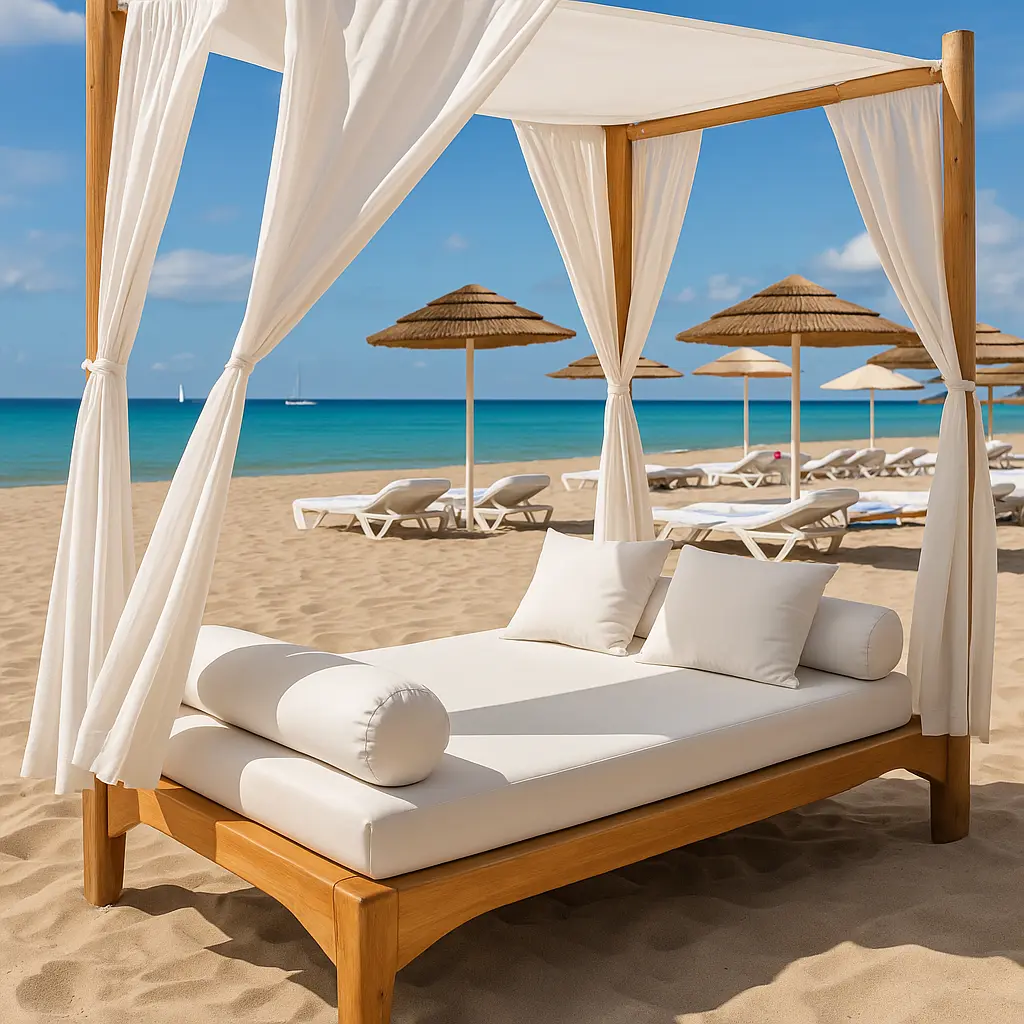The Sophisticated Investor's Guide to Balearic Fractional Ownership: When Sharing Really Is Caring
How savvy property investors are unlocking Mediterranean luxury for a fraction of the cost—and turning unused weeks into rather decent pocket money
The notion of sharing one’s holiday home might once have seemed frightfully common to the upper-middle classes, conjuring images of dreadful timeshare presentations in Torremolinos. Yet fractional ownership in the Balearics has emerged as something rather more civilised: a sophisticated investment strategy that allows discerning buyers to own a slice of Mediterranean paradise without the eye-watering price tag—or the tedious (and ruining) business of maintenance.
With prime Balearic properties now starting from €1-2 million (roughly £860,000-£1.72 million at current exchange rates), fractional ownership offers entry points from €150,000-€256,000 (£129,000-£220,000)—rather more palatable for those who prefer not to liquidate their entire pension pot for a second home.
The Mathematics of Mediterranean Luxury
Fractional ownership allows buyers to purchase shares ranging from one-eighth to one-half of high-end holiday properties, granting exclusive use for for1.5-6 months annually depending on the fraction purchased (usually eight shares in total). Modern co-ownership platforms offer 44 vacation days annually for a 1/8 share—more than most Britons manage to take anyway, given our national tendency to check emails poolside. In Europe, usage of a holiday home is on average 35 days a year, and that is not even for very premium properties with UHNW owners, where it is nearer the two-week usage a year (just check that 6M€ Courchevel chalet…)!
The numbers are compelling. Take Ibiza, where peak season rates have reached €627 per night—the highest in Spain and representing an income opportunity that would make even a hedge fund manager pause. A fractional owner renting out just two weeks during peak season could theoretically generate over €8,700, effectively covering their annual running costs while lounging somewhere considerably less expensive.
The Balearics have achieved the rather remarkable feat of becoming Europe’s most expensive rental destination, commanding 31% of Spain’s national holiday rental market with occupancy rates approaching 90% during peak season. For context, that’s better performance than most London rental properties manage, and with considerably better weather.
For those unfamiliar with the mechanics, understanding how co-ownership works proves essential before diving into specific market opportunities.
Ibiza: Where Hedonism Meets Investment Acumen
Ibiza represents the crown jewel of Balearic fractional ownership, though one must navigate around the island’s reputation for questionable electronic music and even more questionable cocktail prices. Properties in the Dalt Vila-La Marina area show 72.9% foreign demand, with luxury homes commanding an average of €2.15 million—or £1.85 million for those still thinking in proper currency.
The island has experienced a 55% price increase in luxury homes year-over-year, making early fractional ownership investors rather smugly satisfied with their prescience. Weekly villa rentals range on average €2,500-€6,000 (£2,150-£5,160), suggesting that one’s unused weeks could generate enough income to fund a decent shooting weekend in Scotland—with change left over for proper whisky.
What makes Ibiza particularly attractive is its transformation from party island to sophisticated retreat. The clientele has evolved from gap-year students armed with glow sticks to affluent professionals seeking wellness retreats and family holidays. This demographic shift has supported sustained rental demand beyond the traditional club season, extending viable rental periods from April through October.
The island’s limited land availability and strict development restrictions create natural scarcity value—always helpful for property appreciation. Current Balearic fractional ownership opportunities reflect this scarcity premium whilst offering access to previously unattainable luxury properties.
Menorca: The Thinking Person’s Balearic
While Ibiza attracts headlines, Menorca represents perhaps the most compelling fractional ownership opportunity for the discerning British investor. The island has recorded over 200,000 daily visitors for 43 consecutive days in 2023, breaking historical records whilst maintaining its UNESCO Biosphere Reserve status—a rare combination of popularity and preservation.
Hotel occupancy reached 67.5% (up from 65.8% in 2019), but more telling is the addition of 30,000 official tourist beds through short-term rental platforms. This suggests robust demand for private accommodation that fractional owners can capitalise upon, assuming proper licensing is in place.
Menorca’s appeal lies partly in its relative restraint. Development remains controlled, beaches stay uncrowded, and the local gin is surprisingly decent. For foreign investors, it offers the Mediterranean climate without the Mediterranean chaos—rather like the Cotswolds with better swimming opportunities.
Property prices have increased 15% in prime coastal areas, yet Menorca remains more accessible than its flashier siblings. Weekly luxury rental rates consistently exceed €3,000 during peak season, with properties commanding premium rates due to scarcity and the island’s reputation for sophisticated tourism.
The Licensing Labyrinth: Where Fortunes Are Made and Lost
Here lies the crucial detail that separates profitable fractional ownership from expensive holiday arrangements: tourist licensing requirements. This regulatory complexity provides astute investors with significant advantages, assuming they navigate it properly.
Mallorca presents the most restrictive environment, where no new short-term rental licenses (ETV) are being issued until 2026 or longer. Existing licensed properties have become increasingly valuable, with fines for unlicensed rentals starting at €20,000 and exceeding €50,000—rather more than one typically budgets for Mediterranean mishaps.
The licensing restriction means only properties with existing licenses can legally operate short-term rentals, creating scarcity value that supports premium pricing. For fractional ownership investors, this transforms licensed properties into something approaching gold dust—valuable, scarce, and likely to appreciate.
Ibiza and Menorca operate under more flexible licensing regimes, though specific requirements vary by municipality. The success of established fractional ownership programs suggests navigable regulatory frameworks exist, though due diligence remains essential.
Investment Returns: More Than Just Lifestyle
Rental yields across the Balearics are strengthening, with Palma achieving 5.14% average gross rental yield and Menorca showing rising yields as tourism demand increases. Property price growth reached 19.08% for second-hand properties in 2024—performance that would make most portfolio managers rather envious.
The dual-return potential—appreciation plus rental income—creates compelling investment mathematics. Consider a €200,000 fractional ownership investment in Ibiza generating €6,000 annually in rental income whilst appreciating at 10% annually. The combined return approaches levels typically associated with considerably riskier investments.
International demand remains robust, driven by buyers from Germany, UK, Nordic countries, France, Netherlands, Austria, and Switzerland. British buyers particularly favour properties offering both investment potential and lifestyle benefits—fractional ownership delivers both whilst requiring significantly less capital than outright purchase.
The benefits of fractional ownership for second homes extend beyond mere financial returns, encompassing lifestyle enhancement, risk mitigation, and professional management that traditional ownership rarely provides.
The Operational Reality
Fractional ownership succeeds through professional management that handles the quotidian details of property ownership. Hassle-free ownership includes maintenance, cleaning, and administration, allowing owners to arrive, uncork the rosé, and pretend they’ve always lived this way.
Smart reservation systems ensure fair access across seasons, using rotation algorithms that prevent any single owner monopolising peak periods. Most programs guarantee each owner access to high, medium, and low season weeks—democratic luxury, if you will.
The shared expense model proves particularly attractive for British investors accustomed to London property costs. Maintenance, utilities, and management fees split among fractional owners typically cost less than maintaining a London garden flat, yet provide access to Mediterranean luxury with staff who actually answer the telephone.
Market Outlook: Sustained Demand Meets Limited Supply
Property sales are expected to increase by 12.1% whilst rental prices are projected to rise by 10.3% in 2025. Supply constraints including limited accommodation capacity and regulatory restrictions continue supporting price appreciation across all Balearic islands.
The convergence of high property prices, strong tourism demand, and regulatory constraints creates ideal conditions for fractional ownership growth. As traditional property ownership becomes increasingly expensive, fractional models offer practical solutions for accessing luxury real estate markets.
Menorca’s tourism growth shows particular promise, with the island successfully attracting sophisticated visitors whilst maintaining environmental standards. For fractional ownership investors, this suggests sustainable long-term demand without the overtourism concerns affecting other Mediterranean destinations.
Getting Started: The Practical Path Forward
For those intrigued by the possibilities of Balearic fractional ownership, the process begins with understanding one’s investment objectives and lifestyle preferences. The most successful fractional owners approach the decision with clear parameters: desired location, usage patterns, and financial expectations.
Due diligence remains paramount, particularly regarding licensing status and management company credentials. Properties with established rental licenses command premium valuations but offer genuine income potential, whilst unlicensed properties may provide lifestyle benefits and appreciation potential without the rental component.
Those seeking a structured approach might benefit from following a simple 4-step guide that outlines the essential considerations and decision points for successful fractional ownership investment.
The sophisticated investor should also consider portfolio diversification across different property types and locations. Whilst Mediterranean beach properties offer obvious appeal, a balanced co-ownership portfolio might include Alpine retreats for winter sports and urban properties for cultural city breaks.
The Verdict: Sophisticated Sharing for Savvy Investors
Fractional ownership in Ibiza and Menorca represents something rather more evolved than traditional holiday home ownership—it’s property investment designed for people who appreciate both financial returns and lifestyle benefits without the traditional complications.
The key lies in selecting properly licensed properties managed by established companies with proven track records. Licensed properties in Ibiza and Menorca offer genuine rental income potential, transforming vacation homes into working assets that contribute to the portfolio whilst providing Mediterranean escapism.
For the sophisticated British investor seeking exposure to European luxury real estate without complete financial commitment, Balearic fractional ownership offers an increasingly attractive proposition. One might say it’s rather like having one’s cake and eating it—assuming the cake comes with sea views, reliable WiFi, and the option to rent it out when one’s back in Blighty earning the money to pay for it all.
Those ready to explore this sophisticated investment opportunity might consider scheduling a consultation to discuss specific requirements and available properties. After all, the best investment opportunities rarely wait for those still deciding whether they can afford them.
The author owns a small interest in Mediterranean property and admits to checking rental rates with unseemly frequency
Ready to own that dream property?
Get in touch with our team to secure your share today.



